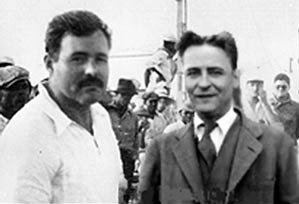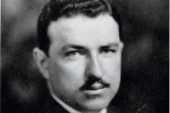Simanaitis Says
On cars, old, new and future; science & technology; vintage airplanes, computer flight simulation of them; Sherlockiana; our English language; travel; and other stuff
HEMINGWAY DECKED; FITZGERALD BLAMED
YES, HEMINGWAY as in Earnest and Fitzgerald as in F. Scott. I experienced a frisson of excitement when I learned of this odd boxing match in the “Letters” column of the London Review of Books, March 3, 2016. The point of the reader’s letter was that Hemingway hadn’t boxed poet Ezra Pound in Paris in 1929. Pound was almost 14 years older than the 30-year-old Hemingway. Rather, Hemingway’s combatant was Canadian writer Morley Callaghan, 26 at the time. F. Scott Fitzgerald acted as the timekeeper.
And, indeed, Hemingway got decked. Petulantly, he blamed Fitzgerald, not Callaghan.
This tidbit obviously called for a bit of research. However, the more I learned, the less definitive matters became. Except for one thing I already suspected: Hemingway could be a jerk.

Ernest Hemingway, 1899 – 1961, American author, Nobel Laurate in Literature 1954; F. Scott Fitzgerald, 1896 – 1940, American author of the 1920s’ Jazz Age. Image c. 1925.
Background on the combatants: Callaghan and Hemingway were part of the 1920s Paris expat literary scene. Callaghan already had some renown; Hemingway was up-and-coming. Hemingway’s interests in boxing were intellectual, part of his macho personality. Callaghan had sparred with Canadian professionals and was the better boxer.

There is no lack of Hemingway pugilistic photos. Images, left to right, from Open Culture, A Boat Against the Current and Fightland.
The conventional tale: The location was the American Club of Paris, July 1929. Mutual pal F. Scott Fitzgerald was timekeeper in charge of setting three-minute rounds with a minute rest in between. In the second round, Callaghan bloodied Hemingway’s lip. Fitzgerald was upset by the blood and forgot his timing chore. Hemingway let his defenses down. Callaghan caught him on the jaw and knocked him flat on his back.
Fitzgerald said, “Oh, my God! I let the round go four minutes!”
“Christ!” Hemingway responded, “All right, Scott. If you want to see me getting the shit knocked out of me, just say so. Only don’t say you made a mistake.”
The three friends never completely resolved the matter.
In fact, this wasn’t the first time Callaghan bloodied Hemingway. A first-person account of two Hemingway/Callaghan bouts comes from Callaghan himself in his memoir That Summer in Paris, 1963. The book can be read online, with the relevant portions in Chapters 15 and 26 (not 27, as cited in one of the internet references).

Morley Edward Callaghan, 1903 – 1990, Canadian author, Order of Canada, Order of Ontario, Fellow of the Royal Society of Canada. Sparring partner of Ernest Hemingway, 1929.
Hemingway initially invited Callaghan to an informal sparring session, light stuff where each guy felt out the other’s abilities. Of Hemingway’s technique, Callaghan wrote, “He was a big rough tough clumsy unscientific man.”
This in turn led to their first bout at the American Club of Paris, a place that had no gym per se; rather, they used a room emptied for the activity. Hemingway took several punches to the mouth, after which Callaghan reported, “Suddenly he spat at me; he spat a mouthful of blood …. I was so shocked I dropped my gloves. We stared at each other. ‘That’s what the bullfighters do when they’re wounded. It’s a way of showing contempt,’ he [Hemingway] said solemnly.”
“Ernest and his boxing!” continued Callaghan. “After the events I’m relating had occurred, Ernest back in the States could say to Josephine Herbst [American writer/journalist], ‘But my writing is nothing. My boxing is everything.’ ”
In August 1929, Hemingway wrote of their second bout to Scribner editor Maxwell Perkins (who represented the other two authors as well): “I couldnt [sic] see him hardly—had a couple of whiskey’s enroute…. Morley commenced to pop me and cut my mouth, mushed up my face in general….”
On the other hand, more than a decade later, Hemingway offered a different tale of the encounters in a letter to a friend: “Have only boxed twice. Guy didn’t know much but was 190 and only 26 [Callaghan’s specs]. Cut my lips with a good left jab…. Then we got friendly after that….” (Nothing about the bullfighter contempt.)

This 1941 photo helps to date Hemingway’s undated letter. “Marty” refers to Martha Gellhorn, his third wife, 1940 – 1945. The letter cites their being in China.
Of the second bout, Hemingway wrote, “But the second time we boxed the twirp cut my mouth again with the first punch and I went around for about a week with crusts on my kisser. But I punched him silly…. The second time we were boxing outdoors on a cement floor in the garden behind the hotel. I was afraid to try to dump him because of the cement.”
A good story, perhaps….
Jack Dempsey, World Heavyweight Champion, 1919 – 1926, and also a Paris expat at the time, offers another opinion. In Flame of Pure Fire, his biography, he’s quoted as saying, “I had this sense that Hemingway, who really thought he could box, would come out of the corner like a madman. To stop him I would have to hurt him badly…. That’s why I never sparred with him.”
Hemingway took his own life in 1961. In retrospect, in a 1963 review of Callaghan’s That Summer in Paris, Norman Mailer, Pulitzer Prize winner and another pugilistic author, wrote, “It is possible Hemingway lived every day of his life in the style of a suicide.”
Callaghan, who died in 1990 at age 87, became annoyed by the whole matter. In the CBC documentary The Life and Times of Morley Callaghan, he said, “I want to be remembered for some story I wrote, not for this nonsense.” ds
© Dennis Simanaitis, SimanaitisSays.com, 2016

“It is possible Hemingway lived every days of his life IN THE STYLE OF A SUICIDE.” As the biographer and long-time (onetime) friend of Norman Mailer I’ve often wondered what Norman’s pomposity here really meant for him — for Norman, that is. Was it more, or less, than a deep-seated need to sound impressive, oracle-like, or did it betoken a real love and respect for EH?
Slightly affected by whiskey myself (bourbon), I think think these guys may have been a little balmy – as are we all. All a part of dealing with life.
You got that right, Mark. Human activity has been fueled by ethanol long before it entered gasoline.